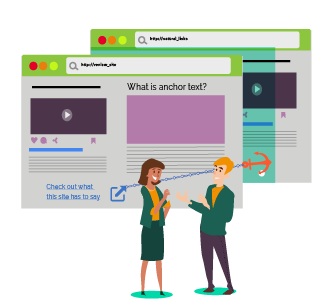When it comes to your off-page SEO, link building is one of the most important things you can do to improve your site’s rankings.
Links are extremely important for your website. They act as the nods of assurances from other sites. These tell searchers and search engines alike that the content on your site is credible, relevant, and informative.
Search engines will infer these links when indexing your site. And, willl place pages higher in search results pages (SERPs) that have quality backlinks, over sites that simply have great on-page SEO.
The key thing here is quality. You want to ensure the links you’re obtaining are from quality and credible sources. Otherwise, you could be penalised, or prevent yourself from ranking altogether.
This is where creating a natural link profile for your website is vital.

There are ways you can ensure the links you’re obtaining are ‘natural’ and relevant to what your site is about. We’ll take a look at some of them in detail. As well as looking further at why a natural link profile is so important for your website’s success.
Link Building: A Short History on Spam
In 1998, Google radically changed the world of digital marketing with the introduction of its search engine algorithm update, PageRank. This radical new update changed the way websites could rank organically. Namely, it equated a page’s value with the number of links it had.
In short, the more links a website had, the higher quality it was deemed to be. Therefore, Google would rank sites with the most number of links much higher than sites of equal quality with fewer links.
However, many dark marketers saw an opportunity with this update. They used some frowned upon techniques to artificially inflate their rankings.
This included:
- Buying links from lots of low quality sites
- Selling their site to a link farm
- Writing gibberish text, then making it invisible to the user’s eye
- Spamming sites with lots of these links
These techniques made for a poor user experience. They tricked the search engine into making low quality sites rank higher than those with genuinely relevant and helpful pages.
Luckily, a few years ago, Google caught onto these scammers, and so introduced the Penguin update to their algorithm. This update means that Google’s bots now take link quality into account when ranking pages. They also punish sites with large quantities of low-value links.
So, if you want to rank highly today, you arguably need two things. To have genuinely valuable content and links from external sites with a good domain authority.
And this is where a natural link profile is vital.
What Is A Natural Link Profile?
A link profile is the culmination of all your website’s inbound links. It’s how search engines look at your online reputation, as indicated by the links from external websites. It includes:
- The number of links coming to your site
- What content or anchor text they’re linking to
- Who is linking to your site
- How the links have been created

A natural link profile is one which contains links to and from external sites relevant to your brand and target audience. Simply put: they appear to be a natural fit to your site and its content.
These links are non-spammy, and come from authoritative and credible sources. They should reflect the content and services you offer. And, act as recommendations for searchers and search engines who are genuinely interested in what your website has to offer.
How To Create A Natural Link Profile
1. Create Link-Worthy Content
One of the first things you need to consider before starting to link build is how link-worthy your content is.
Is it fresh? Unique? Relevant to your brand’s niche?
If you answered ‘no’ to any of these questions, then don’t be surprised if you struggle to get backlinks. After all, why would you expect any website to want to link to content that’s outdated, irrelevant, and just offers the same guidance as everyone else.
Brands want to be associated with helpful, well-researched and informative content. It proves to their readers they’re up-to-date with the latest advancements, Thus, also proving their authority as a thought leader in the industry.
Therefore, anything you create needs to have one sole purpose at its core: to fulfil your target audience’s search intent.
If you can create content that’s helpful and addresses what people are interested in looking at right now, then it’s far more likely to be linked to by other sites trying to do the same thing.
2. Create Content For Other Websites
Producing content for external sites is a great way to gain valuable links. It will also demonstrate your expertise in your industry.
There are lots of ways you can create content for other websites, these could include:
- Writing guest blogs
- Creating infographics
- Participating in video interviews and podcasts
You’ll have to reach out to the site yourself and decide what type of content they would find most relevant for their site.
But, before first contacting them, always ensure that the websites you’re reaching out to are relevant to your expertise. Otherwise you’ll be wasting your time trying to target the wrong audiences.
When pitching your content ideas to an external site, always remember to make sure your ideas are unique to anything on their site, and would be purposeful to their audience.
And, don’t forget to make sure that once your content is uploaded to their website that they have linked back to your website.
3. Links From Social Media

If your brand is active on social media – which it should be – then you need to make sure your profiles are set up and used correctly to provide several easy links back to your website.
Most social media platforms will have a designated box on your profile settings for you to input your website’s URL. These links are inferred by search engines, and are an easy way to obtain some backlinks from reputable sites.
Ensure you make the most of your social media platform. Where relevant, always include a link back to your website in your regular posts, or even in your bio.
Just remember to only include links where relevant. You don’t want to appear too salesy in your posts or spam your followers with hundreds of links.
Social media is all about showing the more informal side of a brand. So make sure it’s easy for your followers to want to engage with you.
Links From Directories
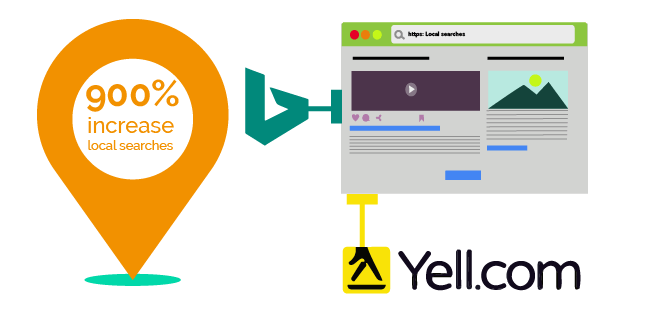
Gaining inbound links from directories is one of the easiest ways to increase your exposure and get a link from a quality site.
There are hundreds of online directories out there, with some of the biggest in the UK being Yell and Bing Places. And, there are also plenty of industry and location-specific directories which you can look at listing your business with.
In fact, with a 900% increase of ‘near me’ and ‘close by’ type searches over the past two years, these directories could be a great place to increase your site traffic, and gain an easy link from a trusted source. They will help to boost your local seo ranking too.
5. Interact With Forums & Question Pages

Engaging with forums is another great way to build your authority as a brand, and gain a few valuable backlinks to your site.
Consider question posting sites such as Yahoo! Answers and Quora. These are popular places for searchers to turn to when they have a query they can’t resolve themselves.
By answering questions that are relevant to your niche, you’ll be building your credibility as a voice in this industry. And, if relevant, you can gain backlinks to your website, by guiding searchers towards further content on your website which offers value to their search.
Of course, only engage with the forums which are most relevant to your website. And don’t spam searchers with a link to your site unless it genuinely offers further help for the searcher.
6. Comment On Relevant Blogs
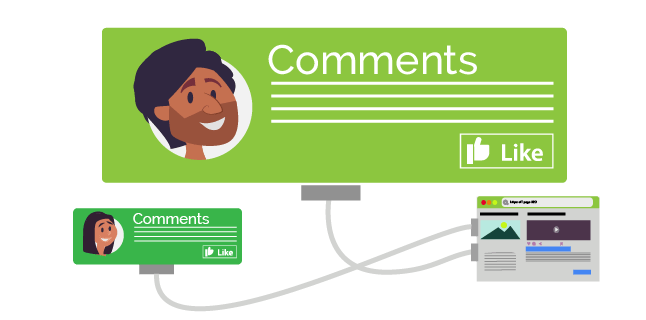
It’s always good to keep up-to-date with the latest developments in your industry’s field. That can mean reading blogs from the industry’s experts who share all the latest information and updates.
Commenting on these blogs is a great way to give your brand exposure, share your opinion and authority, as well as place a link back to your site.
Obviously you should only engage with relevant posts, and only leave a comment if you have something important to say. Don’t comment for the sake of leaving a link.
If you can say something inquisitive that drives people to want to find out more about you and your brand, then the URL you leave in your comment will have lots of clicks through to your site – another great bonus of link building!
Also, never forget to check the domain authority of the blog you’re commenting on. You don’t want to leave a link back to your website from a low quality website as this could harm your rankings – unless you’re going to stop search engines from tracking it.
7. Review Sites
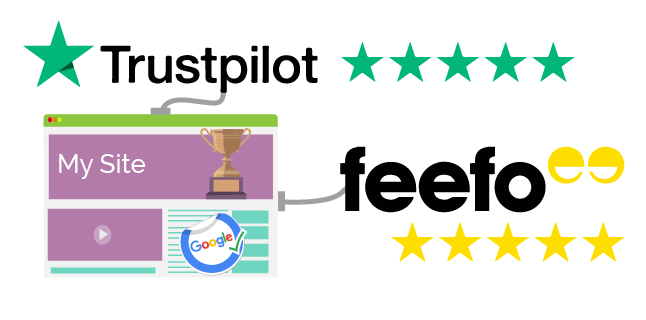
Another relatively easy way to gain links back to your website is to make sure you’re set up on some common review sites, such as Trustpilot or Feefo.
Having your website’s main URL on a review site is an easy way to gain backlinks from reputable sites.
It’s also a great way to prove yourself as a credible company. And it will encourage honest feedback, as well as create opportunities for valuable conversations with your customers.
If you’re responding to customer testimonials, it’s also an opportunity to include even more backlinks to your site.
For example, if a customer leaves a low-rated review because they’re disgruntled that you refused to accept their refund past the accepted returns date, you could include a link to your Terms & Conditions page.
Not only would you be getting a backlink to one of your internal pages, but you would also be showing prospective customers complete transparency. Thus, directing them to relevant pages which may help with their decision-making when it comes to making a transaction.
Of course, only include a link to your site if it’s completely necessary. Review sites are not a sales platform. You’ll do your reputation more harm than good if customers know you’re using it for your own benefit.
8. Don’t Focus On Your Homepage

When link building, it’s very easy to fall into the trap of only sharing your site’s main URL – the homepage.
In order to create a natural link profile, you want to vary which pages your inbound links are connecting with. This will help to increase your overall rankings by telling Google that you, as a brand, are garnering interest.
Even if you don’t think you can link to any specific pages on your site, there may be other ‘general’ pages you can link to.
For example, if an external site writes a short feature about you and your brand, could you include a link back to your ‘about us’ page? Would it still be as relevant as your homepage if a visitor landed on it?
Alternatively, if you are listed on a directory, could the link connect to your ‘contact us’ page, where your general business information is displayed?
9. Treat Link Building Like PR
This isn’t a particular tactic as such, but is a great approach to have when creating a natural link profile. In fact, it’s good practice when doing any link building.
Natural link building isn’t just an opportunity to improve your SEO, but really boost your brand’s exposure and get seen by more people. So, you should always think of it as a PR strategy too.
Engaging with online journalists, magazines, industry influencers and other relevant and credible sites takes a lot of good strategising. You need to research new sites to connect with. Then, create content that’s relevant to these sites and target audiences. In addition to this, build great connections with a new network of people who you can work with in the future.
Just like PR, ensure you’re engaging with the best sites for your brand. Don’t always try to target the industry’s market leaders. Chances are you’ll need to have a lot of credited sites linking to you first before they’ll even consider working on a content campaign with you.
Instead, reaching out to smaller brands or micro influencers with a niche audience can increase your conversions, and also create some small and easy wins for your backlinking.
When it comes to link building, treat everything you do as a networking opportunity – you never know what doors it could open up to in the future!
10. Never Buy Links

It seems rather obvious, but sometimes great sales pitches may make you believe that buying links could actually help with your SEO.
The truth is, buying links will never get you anywhere in terms of improving your rankings.
Sites that offer space to include a link to your site will never truly be relevant to your site. Not to mention, they probably have a lower domain authority than you already have. Your site could damage its rankings, or be penalised and removed from ranking entirely!
The best way to look at it is – if it seems like a quick and easy shortcut, then avoid it at all costs.
Make Sure You’re Getting A Mix Of Backlinks
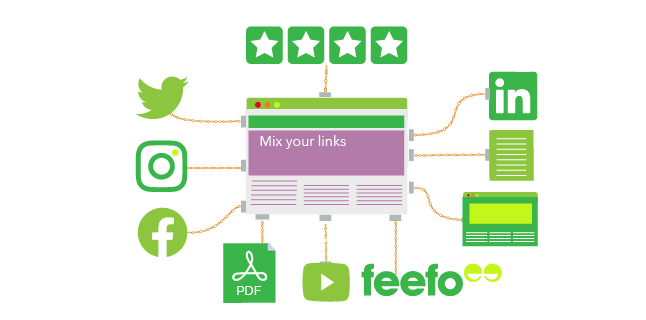
As we’ve seen, there are lots of different ways you can get inbound links to your site. And, you should try to ensure you have a good mix of the types of links coming to your website.
Not only will it give your site the best chances of exposure, but it will also prove you have a varied and seemingly ‘natural’ mix of links featured on your website.
This mix will add to your credibility as an author in your niche. Search engines will understand that your content is gauging traction from different sources, and that you’re saying things that are clearly worth listening to
Remember, You Can Remove Low Quality Links
As you start to gain traction on your link building process, it can be very easy to lose sight of your backlinks. Where are all your links are coming from, and are any low-quality sites linking to you?
Therefore, it’s essential you regularly monitor your backlinks to prevent these less credible sites from damaging your rankings.
There are lots of tools out there which will allow you to track your links, including Google’s very own Search Console.
When examining these sites, you want to check a few things:
- Does the external page have content that’s relevant to your page’s content?
- Is the site’s domain authority high?
- How many other links are on the external page?
- If you were a visitor to that site, would clicking on the link add value to your search experience?
By asking yourself these questions, you’ll be able to identify links that may need to be removed or modified to make them seem natural to your website. Whether it be through including nofollow HTML code, reaching out to the website directly to remove the link, or, as a last resort, using a disavow tool.
Summary
Backlinks – or inbound links as they’re commonly referred to – are extremely valuable to your offsite SEO. They help you to increase your rankings and your site traffic.
Gaining these links isn’t as easy as it used to be and gaining a natural link profile takes time. Today, you need to ensure you’re link building with sites that have a strong domain authority. If you don’t, and a search engine suspects the link is spammy, they’ll punish you.
Therefore, you want to ensure that you’re creating a natural link profile. This is one where search engines can see that the websites you’re linking to are doing so because the content is relevant and valuable to their target audience.
There are several ways you can try and obtain valuable backlinks. These include writing guest blogs, optimising your social media usage and directories. But also engaging on relevant forums and blogs.
By gaining a variety of inbound links that connect to different areas of your website, you’ll be increasing your overall rankings. And, as such, improve the numbers of visitors that land on your pages.
Using A Marketing Consultant To Manage Your SEO
Creating a natural link profile is a rather time consuming process, especially if you’re just at the beginning of your SEO strategy.
You’ll need to research websites, network with the webmasters and then produce the content needed to help obtain these links. And that’s before you’ve started the analysis part; tracking your links and measuring their impact on your site’s rankings.
This requires quite a lot of time, which, for a small business, could be time better spent elsewhere.
How we can help
If this sounds like you, then outsourcing your SEO to a marketing consultant, such as myself, could be a great alternative.
My team and I could manage your entire SEO strategy. We can build and implement a targeted plan to improve your rankings, increase your site traffic and optimise conversions.
To find out more about how we could help with your SEO strategy, why not get in touch today? We’d be more than happy to have an obligation-free chat about how we could help you to achieve your online goals.





